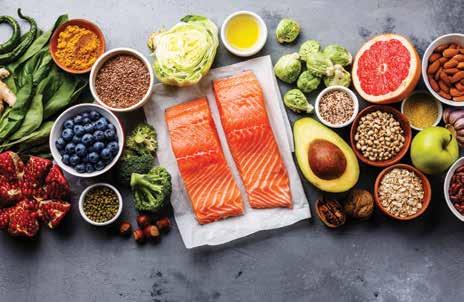








SPRING 2023 EDITOR
Meagan O’Connor, MS, RDN, CSSD, LDN
INCOMING EDITOR
Leda Medina, RDN, LDN, CDCES
EDITORIAL BOARD 2022-2023
Lauri Egan, RDN, CPT
Beth Stark, RDN, LDN
Jessica Oswald, MS, RDN, LD/N
Heather Rudalavage, RDN, LDN
Amanda Sauceda, MS, RDN, CLT
Stephanie Dorfman, MS, RDN
The newsletter pertains to the Nutrition Entrepreneurs Dietetic Practice Group of the Academy of Nutrition and Dietetics and reproduction rights are reserved Publication of an advertisement in the Ventures newsletter should not be considered as an endorsement of the product or advertiser by the DPG Viewpoints and statements in this newsletter do not necessarily reflect policies and/or positions of the Academy of Nutrition and Dietetics
© 2022 Nutrition Entrepreneurs
All rights reserved
WE WELCOME FEEDBACK FROM OUR MEMBERS. PLEASE CONTACT THE EDITOR:
Meagan O’Connor, MS, RDN, CSSD, LDN newsletter@nedpg org

SUBSCRIPTION INFORMATION OR QUESTIONS:
Email NEadmin@NEdpg org
MEAGAN O’CONNOR MS, RDN, CSSD, LDN NEWSLETTER EDITOR
Spring has sprung … even if the weather doesn’t exactly feel like it in all parts of the country
Spring is usually a time of rejuvenation: bears come out of hibernation, birds fly north, flowers bloom, humans start to defrost and get fired up with new projects This can be an exciting time of year, but it also is easy to overextend yourself and start to feel burnt out
So, just like when you are deciding on your March Madness bracket this year, be sure to set your project timeline with intention The more you just wing your bracket or your to-do list, the easier it is to get busted as the tournament just gets started Take some time to really plan out your steps and you can come out on top by the end of this season
I am very excited about the articles included in this issue They offer incredible advice in all different areas – I am confident that at least one of

these articles will speak to YOU So, please set some time aside to really dive into this newsletter I encourage you to take at least one piece of advice from this issue and to try it out in your daily life� Once you do, please share it with us on social media – the more wins we can celebrate with our amazing NE crew, the more we can feed off that energy to keep going in our individual journeys
Meagan
O’Connor, MS, RDN, CSSD, LDN, is a sports dietitian, privatepractice owner, and is the team dietitian for USA Weightlifting In her free time, she enjoys picking up heavy things and then putting them back down (AKA training/competing in powerlifting) As someone who grew up in Chicagoland in the ‘90s, it isn’t surprising to learn that she has a vast collection of Jordans that she only rocks when the ground is free of salt and snow

Hello, Nutrition Entrepreneurs!! As spring is approaching, I can fully acknowledge that it’s tough to work hard and stay focused when the sun is shining through the window and the fresh air is calling your name With that said, here are some friendly reminders for all of us - especially me!

y You can ask for help! That is why we joined NE, right? To find a community of people who share similar goals and values, whom we can celebrate with, but also commiserate with about our struggles as entrepreneurs Use all of your available resources and work smarter and not harder
y Take a break I know this first-hand - that being productive feels great
- but it’s difficult to be productive when you are tired, overworked and burnt-out It’s hard to accept, but even as entrepreneurs, we can’t do it all Breaks are necessary for personal and professional growthand to maintain overall happiness
y Don’t forget about YOU! YOU are the most important part of your life and business If you are not feeling your best, you are not giving everyone around you your best (which is ok … )� It’s important to recognize this within ourselves and set some boundaries and time aside to refill our own cups
If you are reading this, I invite you to take a step back, take a deep breath, and remember that wherever you are and whatever you are doing is OK! And never forget - Nutrition Entrepreneurs is here to support you in your entrepreneurial endeavors (and many, many other things)
Stephanie Dorfman, MS, RD, is passionate about all things wellness, running outdoors, puppies, seltzer and spreading all of the joy Stephanie is the owner of Stephanie Dorfman
Nutrition and also works for a corporate food-service company When she's not working or snuggling with her puppy Norman, you can find her running (usually in Astoria or Central Park), baking challah, or laughing with family and friends
During the summer months, look for her at her favorite sleep-away summer camp, where her family still works and where her grandparents met Stephanie loves being able to combine all her passions into her profession every day

Full disclosure - I am a North Carolina (NC) State Wolfpack fan� I did not graduate from NC State (my brother did) but I did grow up in basketball country You pick a team Your options are NC State, Duke or University of North Carolina (UNC) I selected NC State
In preparation for this article, I rewatched “30 for 30: Survive and Advance ” This documentary is about the 1983 NC State men’s basketball team The team won the NCAA Championship in 1983 and they were the underdogs They did this through what would become “survive and advance ”
As dietitians, visionaries and entrepreneurs, I know there are times that you feel like the underdog Perhaps you are trying to figure out how to get started with your business idea Maybe you’re trying to figure out how to differentiate your services
from the competition Maybe you feel like it’s time to pivot, but you’re not quite sure how to make that happen or what you want to do
Any of these situations, and more, can make you feel like the underdog Other people have already figured out how to start a business Other people have already made their businesses stand out Other people have already pivoted and are doing well If this is you, I want you to remember this quote from Coach V [Jim Valvano of NC State], which he attributed to Reverend Bob Richards, “In every single day, in every walk of life, ordinary people do extraordinary things. Ordinary people accomplish extraordinary things.” You may be the underdog You may feel ordinary Don’t let that stop you from accomplishing something extraordinary for you
Extraordinary for you doesn’t have to be extraordinary for anyone else Extraordinary for you doesn’t have to be huge It needs to matter for you It needs to be an accomplishment for you
This team also practiced being champions They practiced cutting down the net, which is something that teams do when they win championship games� From my perspective, it’s a good thing that they practiced this This practice may have helped them get through the multiple times that their epic run that year should have ended Their run should have ended when a key player broke his foot Their run should have ended when they played UNC in the final game of the ACC Tournament, but Coach V instituted one of his original coaching decisions, the decision to start fouling UNC players late in the game They should have headed home after playing Pepperdine in the first round because they were down six points with a minute left, but they survived�

The point here is not to recount every time this epic underdog team should have gone home I want you to think about an accomplishment that you want to achieve and practice it It may seem silly, but practice it It’s okay if the practice is in your head and you imagine what that accomplishment is It’s okay if you write about that accomplishment Whatever you do, practice your accomplishment in some way
In another quote from Coach V, he said, “Don’t give up Don’t ever give up ” All you have to do is survive and advance Take it one “game” at a time� Survive and advance� (Oh, and GO PACK!)
Jessica Oswald, MS, RDN/LD, is the owner of a private practice specializing in intuitive eating and meal planning She’s also the clinical dietitian at a pediatric rehab hospital for children with developmental disabilities Jessica enjoys cooking, reading and training for the occasional half-marathon She’s also a proud cat mom; ask her about that time she crawled under a car to rescue a kitten
“Don’t give up Don’t ever give up” All you have to do is survive and advance�
 NANCY FARRELL MS, RDN, FAND PAYMENT SPECIALIST
NANCY FARRELL MS, RDN, FAND PAYMENT SPECIALIST

Recently, I had a conversation with some colleagues about a discourse front and center in our profession While misinterpretations, misinformation and hurt feelings on all sides can always happen, it is important to work hard to not continue the cycle Keep your focus on the main goal and objective Don’t let your bracket get busted! As Nelson Mandela once said, “I never lose� I either win or I learn ” As dietitians, see the “fight” as working to keep our profession, our livelihood, our career and the public health alive and well
How do we accomplish this and make a difference at the same time?
1 Commitment. Continue to work as a team to serve all members of an organization as you work to widen your viewpoint Many of us have voluntarily served in such a capacity, and perhaps some of us have not If you haven’t had the chance to yet, consider stepping in� Serving at the national and state levels allows for so many rewarding and varied experiences through relationship building and networking opportunities Each experience is a growth process that requires synergy to benefit all members of the Academy Personalize your experience as you bring new thoughts and ideas to the table Be ready to strategize together with those who oppose your views� View that as a chance to learn together
As the Academy Political Action Committee chair, I worked with the committee members and helped to determine donations that would be allocated to legislators� These funds met the legislative priorities of the Academy Legislative Committee While this job required some difficult conversations along with teamwork, we stayed united in reaching the immediate and long-term goal(s)
Do you complete the Academy Action Alerts regularly? If not, you should Each topic matters (even if it’s not your topic of interest) Every voice matters so that the entire membership is represented
2 Humility is key to success. Set the stage so that you and your colleagues use talents and energy toward a like-minded outcome This may require patience mixed with loyalty, persistence and compromise I believe my words make an impact as I continue to serve as an Academy media spokesperson, a role in which my words in any interview represent all Academy members
3 Heart. Listen more and talk less This is true in the professional and personal world I use the acronym LOVE: Listen Openly to Validate the words spoken, and to Express softly and calmly Add more LOVE to your life� Use empathy and its emotional power to guide, coach and support team members What happens from the heart today has a ripple effect that will last lifetimes
Finally, with all the variances and obstacles in our lives today, be kind to yourself and others We may not know exactly what another person or organization is going through at any given point in time Jumping in and immersing ourselves in “the uncomfortable” is never comfortable Just don’t let your bracket get busted Be sure to take some “me time” to replenish yourself and your soul
Most of us have experienced periods of exhaustion, cynicism or inefficiency, but when you are feeling them all at the same time, it might be burnout
Burnout hit me hard in the summer of 2021 I share this article with you in the hopes you can avoid having burnout sneak up and bite you in the rear end
According to Webster's dictionary, the definition of burnout is exhaustion of physical or emotional strength or motivation usually as a result of prolonged stress or frustration. It is most commonly known as “a syndrome conceptualized as resulting from chronic workplace stress that has not been sufficiently managed ” Trust me when I say, the irony of knowing that my workplace was of my very own making was not lost on me I couldn’t blame a headless corporation or a narcissistic boss, but what I didn’t know then was that women, especially those in a caring field like teaching or healthcare, are especially susceptible to burnout
Let’s explore some of the warning signs leading up to burnout:
The first symptom is heavy exhaustion
No matter what you do, you feel tired
This can also manifest as insomnia or impaired concentration
Physical symptoms at this stage include chest pain, heart palpitations, shortness of breath, GI issues, headaches, decreased appetite, anxiety and depression Sadly, I had most of these but I had places to go and people to see!
If you ignore the exhaustion, you will soon find yourself losing enjoyment in life and/or work� This can lead to isolation, pessimism or detachment As dietitians, we do important and amazing work But when I found myself here, I struggled with compassion fatigue and felt like nothing I did really mattered
If you keep pushing through cynicism, you will eventually begin to feel as though you are no longer effective at what you do This develops into apathy, lack of productivity and poor work performance� This is the place that many women will finally notice
they are “burned out ” If you missed the signs yourself, it’s very likely other people, even your clients, will notice you are definitely not yourself!
Okay, so these symptoms are not great but is burnout really bad for our health? Yes! The health consequences of burnout include coronary disease, hypertension, gastrointestinal problems, depression, anxiety and increased alcohol and/or drug use Emotional issues include marital and family conflict, alienation, a sense of futility and diminished career prospects No one wants to find themselves struggling with any of these, so what can someone do to prevent burnout?
1 Deal with the stress and the stressor.
Stress: the neurological and physiological shift that happens in your body when you encounter one of these threats Essentially fight, flight or freeze Stressors include: Things that activate the stress response in your body� This can be anything you hear, smell, touch, taste, see or imagine could harm you There are external and internal stressors
External: family dynamics, pulling the “second shift,” not being paid a fair wage, your job, cultural norms, patriarchy or living in a marginalized body
Internal: self-criticism, body image, identity, fear of failure or unrealistic expectations
2 Ask for help - Easier said than done for most of us.
For anyone who has trouble asking for help - I’m raising my hand too - see below:
Three ways to get help without asking for it:
1 Stop saying yes to everything, especially “invisible labor ” “No” can be a complete sentence
2 Schedule time for yourself Add exercise or other personal interests to your calendar�
3 Let go of unreasonable standards Accept help when offered Know the person may not offer help perfectly, so offer appreciation rather than criticism
3 Sleep
It turns out sleep is vital! Our whole body, including our brain, works hard
while we sleep Getting good sleep improves our mood, our performance and our overall health Aim for at least seven to eight hours
If you are reading this article and thinking, Oh no! I am already burned out. What should I do now?
y Prioritize taking care of yourself Put your oxygen mask on first� Make sleep, good nutrition, exercise, connection with loved ones, journaling, talk therapy, etc, your priorities
y Analyze your current situation How did you end up here? If you don’t know, try this: track how you spend your time for a week� For each block of time, record what you’re doing, whom you’re with, how you feel (e g , on a scale of 1-10 where 0=angry or depressed and 10=joyful or energized) and how valuable the activity is This gives you a basis for deciding where to make changes that will have the greatest impact�
y Reduce exposure to job stressors You may need to reduce your workload or working hours or take some time away from work Offload low-value/ high-frustration activities wherever you can� Delegate, delegate, delegate! Make a goal of disconnecting from work at night and on weekends I have a tagline that states my email is only checked M-F 9 a m to 5 p m It’s important to note the symptoms for burnout can be similar to depression. While the above advice can help alleviate burnout, if you have tried these and are still not feeling yourself, it may be time to visit your health provider.
What are some steps you are willing to take this year to prevent burnout?
Heather Rudalavage, RDN, LDN,
is the founder of Intuitive
NutritionWhen she isn't working to help clients legalize carbohydrates and feel good in their bodies, she is probably traveling She is married to her high-school sweetheart, so while she can't give you dating advice, she has traveled to over 20 countries, so if you want tips on touring Italy to India, she is your gal

One thing about entrepreneurship
I believe everyone will agree on is being a business owner can be a long, winding, back-and-forth road It is a road that is never finished either Instead it just keeps on going, because we know there is always room for growth and opportunity
For me, entrepreneurship is a constant struggle between finding balance within your role in your business and your role as a fully functional human being with needs If you’re anything like me, your basic human needs can sometimes come last on your priority list
Personally, this is what “basic human needs” means for me:
y Eating (for me, specifically homemade meals)
y Sleeping
y Having a calm mind
y Exercising
y Caring for self (hair, nails, etc )
y Socializing
We have all been there - the constant on-the-go lifestyle “I can do it, just one more email, just one more hour ” You keep pushing and pushing until, oops, you’ve pushed beyond your limits and now … you’re burned out
Paying yourself first should always be at the top of your list� Surprise, surprise, it has not always been at the top of mine Honestly, paying myself first really does not come easy for me; I can be a workaholic most of the time But, after many (yes, many, LOL) burnouts, I realized in order to be successful in whatever business I have, I must FEEL GOOD I must feel good enough to think clearly, to make the best decisions possible and to have a positive attitude in order to put my best foot forward
The alternative: Burnout can really put us in a position where we may make hasty and rash decisions for
our business and most importantly for ourselves We all know lack of selfcare and movement, disordered sleep and high stress loads can all show up in negative ways in many facets of our lives, including our business Thus I decided, regardless of business needs, I am going to pay myself first, because feeling good is not only important for my business but also my health
In order to prevent burnout, here are some questions I ask myself constantly to check myself, my mental health and overall wellbeing:
1 Do I feel energized?
2 Do I feel gratitude and appreciation?
3 When was the last time I washed my hair?
You may think the last one is funny! The reality is that washing my hair is the first thing that goes out the door and it is the first thing I notice when I feel run down, and that is why my hair is one of my benchmarks For me, feeling good on the outside makes me feel good on the inside When I
devote time to my hair or wearing a nice outfit, it seems the day just gets easier and I feel better overall
I know that when I feel great I am energized, my heart is grateful and my curls are voluptuous The minute I do not feel one of the three, I know I have some progress to make in paying myself first I encourage you to create your own check-in questions so you can pay yourself first and prevent burnout Entrepreneurship will always be there but your mental health and wellbeing may not if we don’t start paying ourselves first
Leda Medina, RDN, LDN, CDCES, founder of Dietitian Your Way, a referral website connecting RDNs in private practice to clients so RDNs can thrive! When she isn’t working to help our communities’ health one dietitian at a time, she is spending time with her English bulldog and cooking new cuisines


Have you ever felt like you just wanted to start over and change the way things were done? Did a project not turn out the way you had expected?
What if I told you that there is a way to do it all over without any guilt? Just pivot! You won’t get the day or the time back, but you will get an opportunity to have a clean slate for a “do-over ” It’s okay; business owners do it all the time
Pivoting is when you change the trajectory of your business plan or idea, when you notice the products or services aren’t meeting the needs of the market This could be because you aren’t serving your ideal target market, or you have too many stock-keeping units (SKUs) and only one or two items are your winning SKUs making money, leaving you to eliminate other products sitting on the shelf There are many reasons to change things up and it’s okay
As a business owner of four years, I have pivoted several times just because the big picture in my head did not produce what I expected I formed my company to teach elementaryaged children nutrition through interactive activities�
My first opportunity was working in a gym with established clients I didn’t have to pay rent; I just gave a percentage of what I earned from my clients Awesome, right? It’s only awesome when you have clients Within two weeks I had my first clients, a couple who wanted to lose weight I worked with them for eight weeks It was a successful journey and I couldn’t get over myself They did everything I asked, they lost weight weekly and obtained their goal� My next committed client was four months later I had several clients in between who took advantage of my free 20-minute consultation for 45 minutes of information I got excited talking to them about food, nutrition and cooking No one purchased my services And why would they when they received 45 minutes of free information?
After six months, I had to pivot and get on track My goal was to work with children in a school environment, not adults in a gym I began seeking various methods to get to the decision maker in school districts� It took anywhere from three months to six months to secure a school In the meantime, I had no income I then realized I needed to obtain additional streams of income to survive As I was waiting to get through the school processes, I began doing cooking demonstrations at the local farmers’ markets, libraries, community centers, where the timeframe from the discussion to doing the actual work was one month I continued to do the smaller jobs, while waiting for the big jobs to come to fruition
1 When your clients aren’t purchasing from you. Maybe your product or service is awesome, but you are not marketing to the right people For me, my ideal client was not found in the 24-hour gym I was working in I had to regroup, pivot and go after my intended target market
2 When there is a major life change in the economy, like COVID-19. You must be flexible and be able to adapt to the needs of potential clients by meeting them where they are During the pandemic, I was DONE My in-person workshops in schools no longer existed I had to quickly adapt I partnered with a licensed social worker and provided the nutrition segment to her online mental-health presentations The current need was mental health and boosting one’s immune system
3 When you are constantly chasing the dollar. Pivot! Think outside the box and work smart, not hard Can you create a subscription model to your business so you can continually have a flow of income and possibly make money while you sleep? Instead of providing one-and-done services, can you create a six-week or six-month package deal?
Creating a business is never easy, especially when your dream isn’t perceived the way you thought it would, but success rises when you:

y Have a process in place and a backup plan�
y Listen to what your customers are asking for and find ways to appeal to them
y Be open to making the changes – that’s pivoting!
NutritionLLC Through interactive workshops and programs, she helps families with health concerns improve the quality of life with familiar fresh foods from their cultural heritages Andrea is passionate about children, mentoring and giving back to our communities She believes children will learn through interaction and they are excited to take the lessons home to teach the family
“Just remember, pivoting isn’t Plan B; it’s part of the process�”
JEFF GOINSAndrea Ramos, MCN, is the founder and CEO of Healthy FRIENDZ

There are many ways for dietitians to increase their revenues using passive income streams You are only limited by your creativity Here are some ideas to get you started
Printables are simply files that can be downloaded and printed by a customer, or used digitally to meet a specific need For example, a person with high blood pressure might purchase a PDF blood-pressure tracker to record his/her daily blood pressure (BP) readings Or a tech-savvy user may purchase an Excel template version of that BP tracker instead
Online courses are a terrific income stream for dietitians because they allow us to showcase our expertise The easiest way to get started is to pick a platform to host your course and then utilize the platform’s tutorials to outline and create it� Another way to start building course content is to host and record a single webinar, then repackage it with other webinars on a similar topic
There are several ways to earn passive income with a monetized blog, including signing up for affiliate
programs, hosting ads and creating a product like an ebook to sell from your site However, if you do not currently have a large following, this can be a slower method than the others
If you already have a strong online presence, a membership website can help you make income using products you have already created You simply charge a fee for customers to access exclusive content on your site Some course creators use a membership site to grant people access to all their online courses for the duration of their memberships, while others may provide a certain amount of new content, like recipes or meal plans, each month
Now that you’ve got some ideas for passive income streams, take a moment to ask yourself:
y How would this income stream fit in with the rest of my business?
y Does it help my ideal customer?
y Is it in alignment with my “why” for doing business?
y What is the upfront cost, in both time and money?
y Do I currently have the skills to pursue it? If not, what training would it require?
If you are anything like me, you will be super-excited to try all the above
I have, in fact, tried creating courses, selling printables and monetizing a blog However, I’ve learned that it is wiser to pick just one passive income stream to start with

Once you’ve decided what you want to create, research the income stream itself� You can find examples of printables and discover where people sell them by searching “printable ideas” on Pinterest If you want to create a membership website, find others who already have one and see what they are offering The same is true for blogs, courses or ebooks Find examples of what’s already out there and get ideas for potential platforms or products that may interest you Just make sure to use your research for inspiration in creating your own new product and not in imitation of what others have already done
And don’t forget the resources you already have as an NE member The NE Hub and Facebook Group are great places to ask opinions from other dietitians Or check out the CPE Library to find courses that will fill in the gaps in your knowledge�
In my opinion, passive income streams are a win-win Not only will they make you more profitable, but they will allow you to provide something unique and valuable for your clients too
Helena
Ramadan, MS, RDN, is an avid reader, a fitness enthusiast and a crafter
Always excited to try out new entrepreneurial pursuits, she is currently selling printables in her Etsy store When she is not learning about nutrition or running a business, you can find her exploring the redwood groves of Northern California with her two sons
As with most things, we can argue both sides of the coin
On one end of the spectrum, there are people with private practices on a multi-month waiting list attributed to social media On the opposite side, I’ve met fellow entrepreneurs who have full practices with little to no presence
While I no longer have the telehealth business, I have applied the same data-driven approach to my productbased business My focus started with building an optimized site Since shifting my business model, I’ve wanted to focus more on social media While this can be a beneficial move, I have been hesitant because it has been a time-suck in the past To offset this concern, I recently hired an independent contractor to manage my social media presence
While social media can be a great marketing tool, there is value in diversifying your marketing strategies� Here are some ideas:
y Website strategy, such as search engine optimization
y Word of mouth by referrals and testimonials
y Networking, either online or locally
y Media, including local news stations, newspapers or magazines
y Online media, such as quotes with backlinks to your website
y Social validation, as in reviews and testimonials
Of note, implementing an SEO strategy is a long-term commitment� So wait to scrap this one before giving it ample time to demonstrate its power To offset this, use it in conjunction with other techniques
When I had my telehealth practice, I believed social media would be a primary source of client acquisition For months I spent time creating and sharing content
As I began reviewing referral sources, it became clear social media didn’t play the role I had expected Not to mention that I frequently got lost in the never-ending doom scroll, which meant I wasn’t using my time efficiently
In reviewing the data, I was surprised to learn that most of my clients came through Google searches and aggregate sites After this realization, I focused more on these strategies
Ultimately, it is vital to convert potential clients into email subscribers, regardless of your methods Consider this a non-negotiable practice By creating an email base, you preserve control of your community� Otherwise, you risk losing access to potential clients overnight Unfortunately, changing algorithms can drastically reduce your reach overnight which has happened several times on social media and Google
You may want to know the best approach, but that isn’t possible You must determine which methods provide the best results� Once you know exactly how clients are finding you, focus on doing more of that

If you have a website, set up Google Search Console It will help you to make data-driven decisions
“Many private practices aren’t on social media and are fully booked So it depends on what your strategy is behind using social media for marketing or not It doesn’t have to be implemented in order to be successful!”
LEAH TSUI“Social media has huge potential for your business At first, I did social because I knew I needed to get out there It was great practice to refine bite-sized messages and then it became so much more� Now it is a way to make nutrition info more accessible, a marketing tool and a portfolio that has allowed me to have paid partnerships ”
AMANDA SAUCEDAKristi Coughlin, MS, RDN, is not your typical nutrition entrepreneur After recognizing private practice wasn’t her thing, she opened Bring About Happy, an uplifting, product-based business In her spare time, Kristi can be found eating pizza, at the lake with her husband and kids, or drinking coffee with friends

Title: The Farewell Tour: A Caregiver’s Guide to Sane Nutrition, Stress Management and Better Sleep

Author: Jessica Cording, MS, RD, CDN, INHC
Date: 2022
Publisher: Viva Editions
Price: $18 95 for print book; $9 99 for e-book
Review: In The Farewell Tour, author Jessica Cording discusses her journey through caring for her father, while offering what she calls a “backpack” of “essential self-care practices” instead of mere guidelines or vague platitudes for caregivers The principles outlined within apply to any and all caregivers A song for “Suggested Listening” is offered with each chapter and coordinates beautifully with the chapter topic� Cording offers tips on nutrition and exercise, including suggestions for five- to 15-minute exercise sessions, yet goes beyond to discuss stress management, relationships, spirituality and the grieving process In-depth interviews with experts and leaders in the music industry are sprinkled throughout the book, as are slice-of-life vignettes, which help the story and ideas to flow The advice provided is never preachy or condescending The Farewell Tour Playlist and the Self Care for Caregivers Cheat Sheets are excellent features� I highly recommend this book and wish I’d had it when I cared for my mother who had Alzheimer’s
Reviewer: Evangeline Y Samples, MS, RDN, LD, EdD
Title: Consultant Dietitian
Affiliation: Keegan & Associates
Title: C H E F S : A Culinary Skills Program for Health
Creators: Living Plate Rx and the Culinary Nutrition Collaborative
Date issued: April 2022
Price: Three ways you can access and license the C H E F S program:
(1) License is included as part of a Living Plate Rx membership, (2) License can be purchased for $279/year for non-Living Plate Rx members or (3) Enroll in the C H E F S
Certification for Professional Training and Certification�
What’s Included: The 12-module, self-paced program is offered as a licensed program for health and wellness practitioners to experience and earn 12 CPEUs themselves AND offer to clients through their practices Practitioner can receive unlimited codes for 100% off for clients or can use as a white-labeled program to edit and brand elements and share as a downloadable with clients via practitioner’s EHR or preferred Learning Management System (LMS)
Required equipment: Internet and device on which to stream videos (computer, laptop or handheld devices)
Major Function: 12-module program offering nutrition education + culinary instruction + resources and recipes to set individuals and healthcare practitioners up for success in the kitchen
Target Audience: Healthcare practitioners and their clients
Comments: 12 annual CPEUs are available for healthcare practitioners who go through the program
Review: Have you ever wished that you could help your clients learn HOW to cook and feel more confident in the kitchen or maybe send a chef home with them? Maybe you’ve been thinking about a culinary add-on to your service offerings or found yourself longing for some kitchen inspiration If any of these scenarios sound familiar, then the C H E F S : A Culinary Skills Program for Health program might just be the solution
This 12-module course from Living Plate Rx and the Culinary Nutrition Collaborative is self-paced and ready to launch (or take) the moment you license it Or, you can opt to brand the material Using a mix of engaging videos and aesthetic printed resources, the lessons cover a variety of culinary and nutrition topics, including a Nutrition 101 overview, knife skills, building a healthy kitchen, meal prep and planning, convenience cooking and even gluten-free baking There are also lessons that dive deeply into the health benefits of and easy ways to cook vegetables, whole grains, legumes and beans, healthy fats, nuts and seeds, fruits, animal and plant proteins, dairy and dairy alternatives

No matter what kind of eating pattern your clients (or you) follow or how much they (or you) know beforehand, everyone will walk away with some new nutrition nuggets, recipes or ways to cook new and already favorite foods�
Reviewer: Rima Kleiner, MS, RDN, LDN
Title: Private practice owner
Affiliation: Smart Mouth Nutrition, LLC
As entrepreneurs, the new year is a natural time to reflect and realign your goals for the upcoming year As I did my reflection this January, it brought me back to August and September, when I was experiencing many strong signs of burnout: lack of motivation or energy for work no matter what kind of self-care I did, feeling like I wasn’t able to help my clients like I usually could, and just feeling so drained from consultations that used to light me up I was starting a fueling-station program for athletes and everyone had similar advice: just go with your gut; you will figure it out as you go The term “go with your gut” was a good metaphor for something I was actually seeing a lot of in my consultations� So many athletes were coming to me with gut issues and, while we were working together, we also noticed patterns of stress, anxiety, feelings of burnout, and other mood disorders, all of which can be caused or exacerbated by gut issues
As I looked into the research, I noticed two main patterns where gut issues were stemming from in my athletes and, inadvertently, discovered strategies to help myself deal with some of the symptoms of burnout in the process:
1 Chronic stress and overexercise, especially in females, can lead to oxidative stress (this can be especially prevalent in athletes with high training loads and little time to fuel) and general nervous system dysregulation, which can quickly affect our enteric nervous system, or “second brain” in our guts
2 Chronic undereating in combination with highly processed, highsugar diets can lead to dysbiosis, which we know can affect neurotransmitters in the gut�
We have plenty of validated assessments and tests as well as nutritional strategies that can help with each of these, including:
1 Nutritional strategies to help with oxidative stress:
y Check for vitamin and mineral deficiencies, as many, like Vitamin C, play a large role in dealing with oxidative stress in the body
y Incorporate more antioxidantrich foods, especially fruits and vegetables, with a goal of seven to 10 servings of color per day
y Minimize ultra-processed foods, especially those high in omega-6 fatty acids and sugar

y Focus on adding anthocyanins to your diet on a daily basis, including berries, black currants, cherries (tart cherry juice can help with sleep as well)�
2 Nutritional strategies to help with dysbiosis:
y Validated stool tests, such as GI map, can help us determine daily targeted probiotics and prebiotics as well as other supplement protocols to help regulate dysbiosis
y Lower-sugar and anti-inflammatory protocols can help reduce symptoms and improve dysbiosis
While the following are not nutritional strategies, we know that other lifestyle factors are important to incorporate to help manage stress and alleviate gut issues Some of the most popular and easy to implement include: walking in nature, breathing techniques/meditation, mindful movement such as yoga, journaling, implementing a strong bedtime/ wake routine to get quality sleep and finding true connection in your life�
So if you, like I was, are dealing with any of the signs and symptoms of burnout, let this be your friendly reminder to not only take a look at your physical gut health, but also do a mental “gut check ” Take this time to realign your business and practice with your core values:
y find true connection
y make sure you are taking the time to fuel your own body and rest
y be sure not to just take care of everyone else in your life without taking care of yourself
Erin Pettygrove, RDN, CSCSC, is the full-time sports dietitian working with the athletes at Santa Clara University in California, taking a holistic, athlete-centered, mindful approach to her counseling In her increasingly small private practice, she loves working with athletes and former athletes with a growing interest in preconception, prenatal and postpartum nutrition for moms who were formerly athletes She is a mom to an almost-two-year-old and a mom-to-be to a second baby due this March! In her free-time, she loves to take her four-year-old golden retriever and kids on adventures, travel (even with the littles sometimes!), drink coffee and wine, and most importantly, SLEEP!


As a registered dietitian in private practice, having a virtual assistant (VA) can be an invaluable addition to your team Working with a VA allows you to scale and grow your business by freeing time to focus on what matters most - offering quality services to your clients and growing the business� Here are seven signs it's time for you to invest in the extra help of a virtual assistant:
1 You're spending almost all your time in the business versus working on it. If you spend more than 50% of your time in your practice doing client work and find it impossible to develop growth strategies, that's a big sign to expand and hire a VA A virtual assistant can take on many time-consuming, repetitive, behind-the-scenes type tasks, freeing you up to be the CEO�
2 You have a never-ending to-do list, and your family is complaining that you work too much. It's time to get some help if your workload is getting out of control and you spend too much time on tasks that you could easily delegate to someone else A VA can take on many administrative functions that can be time-consuming, including returning client calls, scheduling, managing your inbox and so much more!
3 You know you need to scale, but you continue to put off creating new services and revenue streams because you're too busy. Creating services such as group programs, online courses and downloadable digital products allows you to make a more significant impact by serving more people who need your help If you don't have enough capacity to plan and execute the creation of these other programs and products, it's time to delegate A VA can help you to stay on track with your product development, creating the necessary assets within your
programs, and depending on the VA’s skillset, might even be able to help you promote on social media
4 You've lost your zest and are feeling burnt out. Suppose you're burning the candle at both ends and considering throwing in the towel on your business In that case, I highly recommend you reassess your situation and consider adding a team member that can take on the tasks that you don't enjoy or aren't in your zone of genius For many of my clients, hiring a VA that can take over the social media tasks makes a world of difference in their quality of life
5 You've hit an income ceiling or reached capacity (without creating more hours in a day or cloning yourself). Especially in a servicebased business such as a nutrition practice, there are only so many billable hours in the day Once you've hit that ceiling, you cannot increase the revenue unless you change your business model, add more passive or leveraged income streams, or hire a team member to take on some of the work In this scenario, I highly recommend hiring a virtual assistant first, and eventually building your team with a new RD
6 You're having difficulty setting boundaries with clients. Challenging and demanding clients can suck the life out of us and play havoc with our self-confidence For example, a client who consistently ignores your cancellation policy and requests to reschedule without penalty can be challenging Your new VA can be the "bad cop" while you focus on providing outstanding nutrition services It works like a charm!
7 You're having trouble staying organized or things are slipping through the cracks. If you're constantly struggling to keep up with everything in running a successful practice and find that mistakes are frequently increasing, it's time to get help There are many moving parts,
and a VA helps by tracking tasks and helping you to meet deadlines - with minimal effort from you
Having a virtual assistant on your team can make all the difference in scaling your nutrition practice (without breaking the bank) By hiring a VA with a suitable skill set, you can delegate areas such as marketing, social media management, appointment and calendar management, customer service, content creation and more
With the VA’s help, you can focus on providing the best service to your clients while your VA takes care of the other tasks
Additionally, having a VA on your team can help you save time and money You can reduce overhead costs by delegating daily tasks and freeing up more of your valuable time for the income-generating tasks that only you can perform in your practice (i e , client work)
Once you've found your perfect fit, you can start working on taking your nutrition practice to the next level of success!
Lesli Bitel, MBA, RDN, LDN, is a sought-after business strategist and coach who has helped hundreds of top nutrition and functional medicine professionals create highly recognizable brands and successful practices with multiple income streams In her work, Lesli supports her clients in overcoming the confusion associated with the business side of creating a thriving practice so they can generate multiple streams of income via 1:1 packages, online courses, group programs and passive income products Lesli is an RDN with specialized training in functional nutrition, mindful eating and wellness coaching, and ran her own successful online practice for many years

Where to start? You have people interested in your services� You’ve dreamed of owning your own business Your counseling skills are honed and ready Now what? You decide to accept insurance
Q: What are the benefits to accepting insurance?
A: We are able to offer increased access to care, as more people are able to afford your services� You will see increased referrals and people will find you because you are in their networks Finally, by submitting claims to insurance, there is documented use of our services, which can improve RDN reputation with the public and with health insurance payers
Q: I’ve heard insurance only covers diabetes and kidney disease; is this true?
A: No! That is true for Medicare insurance, but most commercial policies cover our services at 100% That means there is no cost to the patient, as most insurance companies view our services as preventive And, many, many diagnoses are covered, including weight management, celiac disease, pediatric concerns and eating disorders�
Q: By accepting insurance, does that change my business set-up?
A: Not really All you need is paperwork, a way to take payment, a place to see patients (even telehealth) and that’s about it Once you accept insurance, you agree to HIPAA regulations, but we recommend you follow those guidelines either way
continued marketing With insurancebased services, you are still able to offer excellent nutrition services, but you may not need to spend as much time developing programs and packages Your time (or money) may be spent completing applications to become innetwork, learning about RDN insurance and billing, and setting up systems to process your insurance clients (or paying someone to do this) But just like all good businesses, you need standard forms, intake paperwork and processes
As a new private-practice RDN, I started with little money and lots of time I was able to enroll myself (and other RDNs) and learn everything on my own It wasn’t until years later that we were streamlined; in the lean years we had free claims processing, and an inexpensive e-fax to receive referrals and send progress notes
Q: I’ve heard people spend a lot of time on insurance billing; what do you think?
A: Many RDNs I work with provide services, bill insurance, and never receive or follow up on payment (we all sometimes do this) But, the key is setting up your systems and billing correctly from the start� If you take the easy steps to confirming nutrition services coverage, and how to code and bill, most claims are paid the first time they are submitted Just like all of your business tasks, set aside some time during your week and month to follow up on outstanding insurance items
Q: How do I market my insurance-based services?
Q: What if I want to offer services that insurance doesn’t cover?
A: Most successful private practices have multiple streams of income� Why? We know clinical and counseling can be a burnout; we want to diversify our work and our income That means we can offer other services that insurance doesn’t cover, including meal plans, email and text support, testing and other services and the client can pay out of pocket� Learn what insurance covers and remember what you want to offer your clients as an added benefit
Q: What about start-up time and money; is that different than offering only private-pay services?
A: It is about the same With privatepay services, you work to develop your offerings, services, value and
A: Just being in-network will bring you lots of clients When you are making a marketing plan, think about where your clients are and what other insurancebased services they use That leads us to other healthcare providers: physicians, and other ancillary providers such as speech therapists, physical therapists, psychologists, etc You and your staff can plan ways to let the physicians and others know you are ready to accept referrals Inperson visits, fax marketing, calls and emails are just a few of these ideas
Ingrid Knight, RDN, LD, is a Registered and Licensed Dietitian and the owner and president of Ingrid Knight, RD and Associates, Inc a private practice in Georgia covering multiple states Ingrid offers 1:1 consulting, insurance setups, and training for Registered Dietitian nutritionists and businesses and is a founding member of Nutrition Practice Network (NPN), an online membership site dedicated to all things nutrition private practice NPN offers an extensive document library, mastermind groups and 1:1 expert mentoring
Remember: you are a healthcare provider, and a nutrition expert Take advantage of all the benefits of being an in-network insurance provider and continue to expand our reach and our impact!
 KELSEY KALENDERIAN RD, LDN STUDENT ARTICLE
KELSEY KALENDERIAN RD, LDN STUDENT ARTICLE
Nicole is an award-winning registered dietitian who focuses on professional health, wellness education and counseling She works as a research dietitian at Dana-Farber Cancer Institute and owns her own privatepractice business called Major League Nutrition In a conversation with Northeastern University nutrition MS student Kelsey Kalenderian, Chenard discusses tips for starting your own private practice and ways that she prevents burnout
Q: What made you take the first step to becoming an entrepreneur and starting Major League Nutrition?
A: I was working as a personal trainer at Boston Sports Club (BSC) and at Gold’s Gym, so I already had the 1:1 business mindset I took a business course that was required of all BSC personal trainers When I was in my dietetic internship, I saw how little was accomplished in a 10- to 15-minute consult at the hospital and I wanted to be able to actually help people understand their medical needs
Q: How did you learn about the financial aspects of running a business?
A: Trial and error You learn over time First you want to build trust with your audience with $0� I showed up to a lot of events so I could meet people and get a feel for what worked and what didn’t I make and keep track of my own balance sheets and profit-andloss sheets I recommend working on one thing until you can do it in your sleep, whether it’s how you respond to certain emails, how you tell people what you’re offering or how you come up with your pricing� You need to master the basics If you don’t have enough money to start, start slowly Get a free Facebook page; start your
free Instagram account; volunteer; join DPGs You can also learn a lot on YouTube for free, and take free courses from colleges online sometimes
Q: How do you balance working full-time, running your own business and a personal life?
A: I have not mastered this yet, but one good thing about owning a private practice while also having a salaried position is that I can take a vacation day to work on my own business I have found that it’s very easy to say yes to everyone, but it’s important to look at your calendar and plan to take a day for yourself at least once a month to do whatever you need to do I personally worked every Saturday for a long time to get ahead, but I almost never worked Sundays, unless it was for a volunteer role Boundaries are important
Q: What is your advice for others who want to open their own businesses or want a similar career?
A: Start building your brand and audience now You can always change your personal brand in the future Create Facebook and Instagram accounts to use as free marketing Contact physicians and explain to them why referrals to your practice would benefit them Get involved in DPGs and events, and network as much as possible�
Q: You do so many things - from working with individual clients, creating personalized meal plans, running a blog and a podcast With all that you do, how do you prevent burnout?
A: I do burn out! I make sure to plan fun activities to change things up, like amazing ski trips or time at the lake Nature is critical to well-being and even just an hour outside makes me slow down and helps me recover from all the emails, messages, calls and screens I am a member of the Boston Women’s Business Group and I pay a fee for its inner circle membership This allows me to engage with other
non-dietitian professionals and hear from them and their strategies to prevent burnout and promote success in their businesses These women plan their schedules so systems are in place so they are not the only ones running their business, which is a major factor in burnout level Having a network of people to bounce ideas off has saved me a lot of time
Kelsey
Kalenderian, RD, LDN, is a second-career dietitian presently enrolled in Northeastern University’s nutrition MS program Kelsey has worked as an outpatient dietitian at Tufts Medical Center Weight and Wellness Center specializing in weight management and bariatric surgery

CYNTHIA MOORE
MS, RDN, CDCES, NBC-HWC, c-IAYT1 Recognize that our own emotions can help signal where we need to be setting boundaries
2 Be able to identify at least two actions that contribute to healthful boundaries
3 Learn or practice a skill to improve boundaries for personal/ professional benefit�
You enjoy working with clients and doing all the things that running a business requires, but you also want to be fully present for friends/family time Fitting in self-care activities and personal interests are important too In this article, we will explore what good boundaries look like, the benefits of good boundaries, and how they can help you be in the flow We will also discuss how to recognize the need for stronger boundaries and some ways to create those boundaries
Healthy boundaries define appropriate behavior in our relationships:
1 Boundaries can help keep both parties safe
2 Setting healthy boundaries is crucial for self-care and positive relationships
3 Having “good boundaries” means that individuals have the capability to know themselves, recognize when their values and expectations aren’t being met, and to speak or act on their own behalfs to clarify their preferences�
This topic is one that is near and dear
to my heart, as setting limits and boundaries is a work-in-progress for me “Candy ass” was the (playfully delivered) nickname one of my bosses had for me As painful as hearing that was, that boss was not entirely wrong At the time, I let my inexperience and internal dialogue - what we’d call imposter syndrome today - set me up for having too-soft boundaries Internal questioning and insecurity delayed my decision making and didn’t allow me to stand in my own power and worth in ways that would have better served me and my team
Let’s consider our skin. Our skin serves as a boundary to help keep us safe from infections; it also serves as a container� Healthy boundaries work similarly to our skin They enhance a personal sense of agency, contribute to effective productivity, and allow rewarding, personal-professional relationships
Those skillful at boundaries can thicken boundaries when needed and allow thinner boundaries when in a highly trusted setting
When we have healthy boundaries, we get stuck less often in patterns of people-pleasing, indecision, regret, victim-status, isolation, dismissiveness or confusion�
With effective/healthy boundaries, we’re able to say “yes” when we mean yes, and “no” when we mean no We know what we feel and respond in real time, honestly sharing feelings and experiences Sharing problems directly with the person involved, rather than with third parties, is another hallmark of healthful boundaries
People with healthy boundaries make expectations clear and explicit, rather than assuming others will have similar expectations or be able to mind-
read Clarifying expectations and boundaries can help us and those we care about know what to expect
On the other hand, when a person does not have clear boundaries, it can lead to dysregulated hyper-arousal or hypo-arousal states where we are outside our “window of tolerance�” Stress hormones compensate for dysregulation, adding wearand-tear on major body systems: “the brain, the autonomic nervous system, the immune system, and the endocrine system ” (2, p 203)
When we’re under threat, we don’t have full access to our thinking brain/executive function We will only see limited options We’re out of touch with what we’re feeling, making it more difficult to recognize the need for a limit or to be able to offer a wise response in real time
Under stress/threat, the executive function or thinking brain goes essentially offline, so it narrows the possibilities we see, critically limiting the options; we are less likely to make the best decisions in this state
By paying attention to the breath and body several times a day, we can learn to identify what we’re feeling and more directly identify what we need Knowing what we feel and need is a great first step to setting and tending boundaries
Practicing mindful awareness and stopping to pause for a full belly or box breath can rekindle connection
Years ago, a therapist colleague mentioned she set a quota on the free/discounted public service talks she’d give each year Once she’d met the quota, she declined other
requests for that year - a boundary I too found helpful in my early days in practice Once I learned how to set one boundary, setting others became easier Through experience, I have learned that once I set a boundary, it doesn’t mean I can’t revisit it Boundaries don’t need to be set in stone; it’s a normal part of business (and life) for boundaries to evolve�
1 Identify what matters to youyour values and needs Nurture your own garden There are many online resources to help determine your values if this doesn’t come easy for you
2 Communicate your required or preferred boundaries as you deem appropriate in your varied life contexts Convey or educate others in your work/home or other settings so your needs have a better chance of being honored� See #4 if you want to improve how you communicate
3 Recognize what’s important for you in keeping your own brain/body in optimal balance Cultivating the skills of adequate sleep, stress resilience, movement, and healthful, adequate nutrition are key foundations Yoga, meditation and other mind-body practices help act in our own best interests so we are better able to maintain healthy boundaries
4 Buff up your communication skills Jo Nash, Ph�D�, offers these skills and worksheets as options for rounding out your own boundary-setting skills (1) These links may best be viewed in the online version of Ventures
y Visualize your ideal boundaries See yourself sticking with the promises you make to yourself, working with focus for just the time you’ve planned, completing projects on time, having a great mix of time to relax, play or create, and celebrating worktime accomplishments� The visualizing boundaries worksheet: https://positive b-cdn net/ wp-content/uploads/2022/11/ Visualizing-Your-Boundaries pdf (1)
y Practice getting to “no” https:// positive�b-cdn�net/wp-content/ uploads/2022/11/How-to-SetBoundaries-Saying-No pdf or asking for what you want https://positive b-cdn net/ wp-content/uploads/2022/11/ How-to-Set-Boundaries-StateWhat-You-Want pdf (1)
y Setting boundaries at work (video) https://positivepsychology com/great-self-care-settinghealthy-boundaries/ (1,4)
y Eight steps to deal with boundary violations https:// positive b-cdn net/wp-content/ uploads/2022/11/Dealing-WithBoundary-Violations pdf (1)
5 Setting reasonable expectations With boundary violations, it’s often a mismatch of our expectations If we’re able to feel our feelings and identify what we’ve been expecting in each setting, it can help “name” what is present and allow us to see if we can re-craft an unreasonable expectation into a more reasonable expectation that serves us well (3)
6 Making win-win requests Being in a balanced state nets better outcomes, using mind-body skills for self-regulation often helps It’s useful to offer a connecting statement such as “I can appreciate or understand that ”, then to follow with an “I feel (your own feeling) … I need ” and your request Another honest, empathic statement such as “I appreciate that you took the time to listen and hear this request” could be a good way to close the message (3)
HERE'S AN INVITATION FOR 2023: What are the areas in your life where better boundaries would serve you? Is it the interactions with others? In work, at home,or with service organizations? Is it the structure of your own work time? Or perhaps you want to become more skillful at interrupting and redirecting your own thoughts, i e , to set limits with worry or fear? What would be the advantages of developing better boundaries around those areas of your life?
Are you willing to visualize your own ideal boundaries for even five minutes once a week for a month? Being, “in the flow” requires us to recognize our boundaries and then honor them What boundaries are most important for you?
“You can be in a healthy relationship with others and take care of yourself Healthy people want you to be able to be happy and healthy You are not kind to yourself when you neglect your needs for the needs of others�”
NEDRA GLOVER TAWWAB, MSW, LCSW
1. Nash, J. How to Set Healthy Boundaries & Build Positive Relationships, Positive Psychology.com; 2018. positivepsychology.com/great-selfcare-setting-healthy-boundaries/.
2. Stanley, E. Widen the Window: Training your Brain and Body to Thrive during Stress and Recover from Trauma. Avery, 2019.
3. Moore, C, and Bonham K. Nourishing Resilience Essentials. The Hygeia Press, 2021.
4. Career Contessa. 8 Tips for Creating Boundaries at Work www.youtube. com/watch?v=m05T2Ye5hoc&t=3s
5. Tawwab, N. Set Boundaries, Find Peace: a Guide to Reclaiming Yourself. TarcherPerigee, 2021.
Cynthia Moore offers integrative nutrition and health coaching, serves as contracted faculty for the U S Veterans Administration’s Whole Health initiative, is CEO of the Hygeia Wellness Park and is the author of Live, Love, Lead: 10 Simple Skills to Transform Stress and co-author of Nourishing Resilience Essentials She lives near Charlottesville, Virginia

In a professional journey, there are many opportunities that I like to think of as doors - doors to open with effort, doors that open before you, choices about which doors to walk through, and then stepping forward to see and engage in what emerges along the path beyond each threshold Some paths are long and winding until you arrive at the next door or set of doors Other professional trails are short and direct - those perhaps less frequent for most of us, but they do exist There are also doors that close with time as phases end or evolve, and doors that remain closed but reopen at a later time or when you’re ready to see what’s on the other side� And perhaps the most important feature to consider about all these doors, besides their number, are their thresholds, and the mindset and emotion that we choose as we take that first step each time and once again The key is being present and aware of how we approach these transitions as your departing foot is lifting purposefully after the first foot, still in motion swinging past, establishing that initial step - landing as cautiously as a cat testing a new surface or as surefooted as an Olympic gymnast landing a dismount, depending on your emotion and surety of the moment
While I have more to say about these career - and life - doors and thresholds we pass (stay tuned!), here I want to focus on taking a pause when a moment of recognition or personal accomplishment arrives at your doorstep There are points along the path, special milestones - they may be few or many in your life, but the cumulative magnitude is the same - where others see you in a light that shines on your efforts and achievements along the way� Much of the hard work in our careers is done quietly: we show up, we work with
determination, and quietly labor on toward goals� We are confident, we worry, we ideate, we worry some more, and we invest time, energy, brainpower, money We collaborate, we create, we help others achieve their goals while we work on our own Receiving the Outstanding Nutrition Entrepreneur Award and recognition for 2022 from my professional peers and many personal friends in this group is one of those meaningful points along the path for me when I have been simultaneously proud and humbled, and felt both recognized and shined on for a moment in time I am very grateful
So, what can I offer back in addition to my deep appreciation for this award? Well, perhaps I can inspire you along your own path and series of doors by doing three things:
1 CONNECT: By reminding you that while we are all charting our own professional paths, we also are a community of Nutrition Entrepreneurs - RDNs, NDTRS, professionals and students We are better together Tap into and support each other, find a mentee or mentor, and reach out to others: a thumbs-up, comment or, best yet, quick personal message, email or call - even to someone you don’t know personally - is a vote of confidence for a fellow nutrition colleague We know it feels great to receive and be acknowledged; it feels great to give by bolstering others, too
2 LISTEN: By listening to you, I am encouraging you on your journey, trying to show you additional “doors” by being a sounding board, and helping celebrate as you cross a new threshold Please reach out Engagement with our nutrition community here through a variety of channels, including direct communication, is one of the most rewarding ongoing parts of feeling successful and connected for me, and I hope for you, too
3 ENCOURAGE: By encouraging you to participate in our group by nominating or supporting someone you know for our two annual NE DPG awards, that are an enduring honor and acknowledgment, and come with a generous financial award, as well These are the Outstanding Nutrition Entrepreneur Award for active members with an established dedication to entrepreneurism in nutrition and the Professional Development Dietetic Student Award to recognize students for emerging leadership and achievement, and entrepreneurial endeavors
You can find out more details, past recipients, and deadlines here: https://www.nedpg.org/awards/
So, who (times two!) will it be for 2023? I can’t wait to find out, to congratulate you personally, and see what doors open for you ahead
Wendy Bazilian, DrPH, MA, RDN is a registered dietitian, doctor of public health, and certified exercise physiologist for more than 20 years, who lives with her family in San Diego, California Wendy says: I am grateful to my colleagues, professional peers, and many, many personal friends I have made in the field for nominating and awarding me, and practicing the profession in their many unique and collaborative ways alongside me And I am grateful to be on this professional path in public health and nutrition to help educate and assist others with their health and nutrition goals - using science and evidence, along with practical (and delicious) strategies big and small

Nutrition Entrepreneurs (NE) is the #1 Dietetic Practice Group of the Academy of Nutrition and Dietetics dedicated to entrepreneurs and aspiring entrepreneurs Our members are guided by an overarching mission to create a community that empowers and supports the success of our profession Now it is time to recognize and honor a trailblazer that has inspired and empowered you!
Nominations are now open for the 2023 Outstanding Nutrition Entrepreneur Award and Professional Development Dietetic Student Award.
Do you know a member whose demonstrated originality and dedication to entrepreneurism in nutrition? Nominations are open for the Outstanding Nutrition Entrepreneur Award
Award recipient will receive a $1,500 award and ‘plaque’ for commitment to the field of dietetics as a nutrition entrepreneur and is invited to:
1 Attend the NE DPG FNCE® Networking event
2 Publish an article that highlights his/ her experience with NE DPG in NE DPG’s quarterly newsletter, Ventures
Have you taught or mentored a student member with exceptional leadership skills? The Professional Development Dietetic Student Award is designed to recognize an emerging student leader enrolled in an accredited and approved dietetic education program� The Professional Develompent Dietetic Student Award continues to encourage entrepreneurial endeavors and advocate students to become involved with Nutrition Entrepreneurs Dietetic Practice Group
Award recipient will receive a $1,500 award and ‘plaque' and is invited to:
1 Attend the NE DPG FNCE® Networking event
2 Publish an article that highlights his/her experience with NE DPG in NE DPG’s quarterly newsletter, Ventures
www.nedpg.org/awards
NOMINATIONS
The following documents will be referred to in the Nomination Form:
1 Resume/CV
1 Two Letters of Support – must be received by April 30th to qualify the nominee
SPRING 2023 | VOLUME LI | NUMBER 4
6301 Snidercrest Rd
Mason, OH 45040
Purpose, People and Profit:
The 3 P's of Building a Nutrition Group Practice
MARCH 29 AT 1:00 P.M. EST
Hannah Turnbull, RDN
Leveraging Social Media To Build A Profitable Private Practice
APRIL 25 AT 1:00 P.M. EST
Marissa Carlin, MS, RD, LDN
The Four Proven Online Program Models for Health Practitioners
MAY 11 AT 1:00 P.M. EST
Stephanie Clairmont, MHSc
Beyond Basic Bookkeeping
MAY 23 AT 1:00 P.M. EST
Amanda Stickel, EA
The Power of Design
JUNE 6 AT 1:00 P.M. EST
Lauren Stewart
2023 Global Wellness Trends
JUNE 27 AT 1:00 P.M. EST
Debbie Bellenger, MA
Corporate Wellness and Where & How to Get Started
MARCH 15 AT 2 P.M. EST
Christie Hunter, MS, RD, LDN
Mindset Shifts you need to make as an RD Entrepreneur.
APRIL 17 AT 2 P.M. EST
Christine Thomson, RDN, LDN
What it takes to have a successful business.
MAY 17 AT 2 P.M. EST
Adrien Paczosa, RD, LS, CEDRD